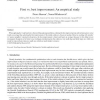Free Online Productivity Tools
i2Speak
i2Symbol
i2OCR
iTex2Img
iWeb2Print
iWeb2Shot
i2Type
iPdf2Split
iPdf2Merge
i2Bopomofo
i2Arabic
i2Style
i2Image
i2PDF
iLatex2Rtf
Sci2ools
120
click to vote
DAM
2006
2006
First vs. best improvement: An empirical study
When applying the 2-opt heuristic to the travelling salesman problem, selecting the best improvement at each iteration gives worse results on average than selecting the first improvement, if the initial solution is chosen at random. However, starting with `greedy' or `nearest neighbor' constructive heuristics, the best improvement is better and faster on average. Reasons for this behavior are investigated. It appears to be better to use exchanges introducing into the solution a very small edge and fairly large one, which can easily be removed later, than two small ones which are much harder to remove.
Related Content
| Added | 11 Dec 2010 |
| Updated | 11 Dec 2010 |
| Type | Journal |
| Year | 2006 |
| Where | DAM |
| Authors | Pierre Hansen, Nenad Mladenovic |
Comments (0)

